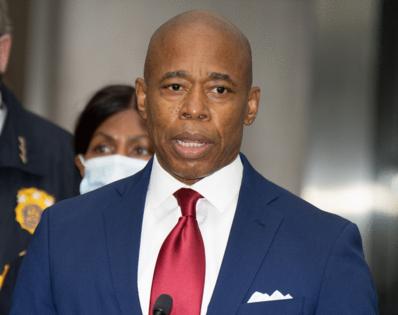Mayor Adams vetoes bills boosting NYC grocery delivery worker wages after lobbying by Amazon, Instacart
Published in Business News
Mayor Adams vetoed two City Council bills late Wednesday that would boost minimum wages for grocery delivery workers to more than $20 an hour — a move that came after his top aide, Randy Mastro, launched an internal advocacy effort against the measures, according to sources familiar with the matter.
The mayor, whose own Department of Consumer and Worker Protection commissioner lauded the bills as recently as late last year, had until midnight Wednesday to veto the measures or they would have lapsed into law.
With just over six hours to go until the deadline, Adams announced he had used his veto pen to block both bills, arguing they would result in higher grocery prices — an issue that has become a big focus on this year’s mayoral campaign trail.
In a statement, Adams argued the increased wage requirements would result in grocery delivery companies jacking up prices on their customers, which he said includes seniors, people with disabilities and SNAP beneficiaries.
“Grocery prices are already too high, so now is not the right time to do anything to drive these prices even higher. Unfortunately, Intro. 1135-A and Intro. 1133-A would do just that at a time when too many working-class New Yorkers are struggling,” the mayor’s statement said, using the index numbers for the measures.
Sources familiar with the matter, who spoke on condition of anonymity, told the Daily News that Adams has in recent weeks been advised by Mastro, his first deputy mayor, to use his veto pen to block the bills. The sources said Diane Savino, a senior adviser to Adams at City Hall, has also been involved in the talks with Mastro and the mayor.
The internal convos came after Amazon and Instacart, two major grocery delivery companies, launched an aggressive lobbying campaign urging Adams to block the bills.
Targeting officials in Adams’ office and at the Department of Consumer and Worker Protection, Amazon and Instacart have made the same argument that the measures would result in higher grocery prices for their customers and also warned of potential layoffs of delivery workers.
“We thank Mayor Adams for recognizing this reality,” Tom McNeil, Instacart’s senior government affairs manager, said after his vetoes.
Council Democrats passed the two bills with veto-proof majorities, meaning they could move to override the mayor’s attempt to block them.
Julia Agos, a spokeswoman for Council Speaker Adrienne Adams, said after the vetoes that the chamber’s Dems are “considering our next steps” and “will always stand up for workers in our city.”
Agos also accused the mayor of “parroting inaccurate talking points” about increased grocery costs. Supporters of the bills have argued third-party delivery platforms would face increased costs, not grocery stores.
“This veto demonstrates that the mayor’s claims to care about working-class New Yorkers and a sustainable delivery industry for New York City are hollow, because he is undermining the workers who make the sector possible,” Agos said. “Without fair wages and protections for delivery workers, there is no sustainable industry, just exploitation.”
One of the two bills, Introduction 1135, would over time require third-party companies like Instacart to pay grocery delivery workers a minimum wage of $21.44. That level matches the minimum wage the city set for restaurant delivery workers earlier this year — a reform that the mayor supported.
The second bill, Introduction 1133, would ensure that any companies with “contracted” workers performing delivery services are protected by the same wage requirements.
The 1133 bill was specifically designed to ensure Amazon would be covered by the new wage rules. Amazon owns WholeFoods, the grocery store chain, so their delivery workers could be defined as closer than third-parties, leading the Council to enact the second bill to plug any potential loophole.
The vetoes come after a December 2024 Council hearing, in which Adams’ Department of Consumer and Worker Protection Commissioner Vilda Vera Mayuga, whose agency oversees wage laws for delivery employees, said she wanted to “enthusiastically commend” the Council for advancing the bills.
“There are many more New York City delivery workers in need of DCWP protections,” she testified.
Adams spokesman Zachary Nosanchuk said the administration’s views have changed since the December testimony as grocery prices have continued to increase.
Grocery prices, and cost-of-living concerns more broadly, have been hotly debated during this year’s mayoral race.
Zohran Mamdani, the Democratic mayoral nominee who’s polling as the favorite to replace Adams, has vowed to if elected open city government-run grocery stores to try to bring down costs of essentials. In a press conference before the mayor’s vetoes, Mamdani said he hoped he wouln’t try to block the bills.
“I think it goes against what so many New Yorkers are calling for, which is a wage they can actually live off of,” he told reporters.
To date, the Council has overridden Adams three times on legislative vetoes, including when he tried to block a bill placing new transparency requirements on NYPD officers. The Council is gearing up to override yet another veto Adams issued earlier this month to kill a bill decriminalizing unlicensed street vending.
Mastro’s involvement in pushing the mayor to veto the grocery delivery bills comes as he has become known at City Hall for his aggressive management style.
Since becoming Adams’ top deputy this spring, Mastro has pushed to reverse several Adams administration initiatives, including a plan to build affordable housing in Manhattan’s Elizabeth Street Garden as well as a new composting fine structure on landlords.
(With assistance by Josephine Stratman.)
©2025 New York Daily News. Visit at nydailynews.com. Distributed by Tribune Content Agency, LLC.












Comments